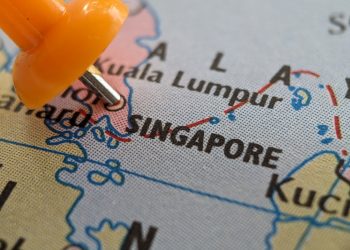Today, container ships at all of California’s major ports use shore power, thanks to technology developed at the Port of Long Beach.
According to the Port of Long Beach, when “K” Line’s Long Beach Bridge arrived at the Port in 2008, it was more than just another ship call. Outwardly, the operations involved in berthing the container ship would have seemed routine: a pilot boarded outside of the breakwater to guide the vessel to the International Transportation Service terminal at Pier G. Mooring operations secured the behemoth vessel to land, allowing ship-to-shore cranes to begin plucking containers. A weather eye might have noticed dockworkers dragging a long cable to the Long Beach Bridge, connecting it into a container-like box on the ship’s side.
Soon after, the ship switched off its auxiliary engines, which were normally used to power vital systems. But the systems – lighting, pumps, computers, air conditioning – churned on. The Long Beach Bridge became the first ship at the Port to plug into shoreside electrical power, eliminating the need to burn diesel fuel to “keep the lights on” during its stay and preventing the accompanying emissions from escaping into the harbor air.
When it comes to tackling emissions from the oceangoing ships that call here, we are no less aggressive, finding ways to push for the cleanest possible ships to visit.
..said Port of Long Beach Executive Director Mario Cordero.
“The Port is making rapid advances toward our goals of transitioning the trucks and terminal equipment handling cargo toward zero emissions,” said Long Beach Harbor Commission President Sharon L. Weissman.
“A key to these advancements is being technology- and fuel-neutral, and focusing on an end goal of becoming cleaner, as quickly as possible. Welcoming ships using the cleanest fuels currently available is an instrumental part of making progress in reducing emissions.”
The Port remains focused on attracting the greenest available ships, and recently updated its Green Ship Incentive Program to offer the highest bonuses in the world to attract the cleanest ships in service. The refreshed program incorporates the international Environmental Ship Index, which identifies seagoing ships exceeding the current emissions standards of the International Maritime Organization.




























































